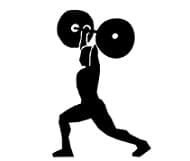In order to know the meaning of the term weightlifting, it is necessary, first of all, to discover its etymological origin. In this case, we can emphasize that it derives from Greek and that, exactly, it is the result of the sum of two lexical components of said language:
-The noun “halter”, which can be translated as “weights” and comes from the verb “haltera”.
-The noun “philes”, which is synonymous with “love” or “inclination” and which derives from the verb “philein”, which means “to love”.
The concept of weightlifting refers to the Olympic discipline that consists of weight lifting . The metal bar that the athlete must lift, which has discs or balls at its ends, is known as a barbell .
 Colloquially called weightlifting , weightlifting can be developed in two competitive forms: snatch (the athlete must lift the weight in a single movement, without interruptions, from the ground until extending his arms above the head ) or two-stroke or clean and jerk ( in this case, the movement can be interrupted when the barbell is at shoulder height). The one who can lift the most weight is the winner of the competition.
Colloquially called weightlifting , weightlifting can be developed in two competitive forms: snatch (the athlete must lift the weight in a single movement, without interruptions, from the ground until extending his arms above the head ) or two-stroke or clean and jerk ( in this case, the movement can be interrupted when the barbell is at shoulder height). The one who can lift the most weight is the winner of the competition.
Athletes who practice weightlifting need to have appropriate clothing that allows them to lift heavy weights without causing any type of damage. Specifically, they must wear flat leather sneakers, wrist guards to protect the wrist joints, a lycra jersey, knee pads and a girdle, which aims to prevent damage to the lower back area.
In the same way, it should be noted that it is also essential that they use magnesium powder to spread it on their hands and thus prevent, due to sweat, the bar they have to lift from slipping.
In the 1896 Athens Olympic Games this discipline was already included. Weightlifting was also part of Saint Louis 1904 . Then he did not appear at the Olympic event for several editions until his return in Antwerp 1920 . Since Sydney 2000 , there has been a women's category.
In any case, the origins of weightlifting are much older. It is estimated that several millennia before Christ , in Chinese territory, exercises were already carried out to demonstrate physical strength . The Greek Milo of Croton , on the other hand, is often noted as a pioneer in weightlifting by lifting weights in the 6th century BC. C.
It should be noted that the International Weightlifting Federation (known as IWF ) was founded in 1905 . This institution is responsible for decreeing and modifying the rules that govern this sport , in addition to organizing events such as the World Weightlifting Championships .
Among the most important figures in weightlifting in recent years is the Spanish Lidia Valentín, originally from León. She competes in the 75 kilo category and has managed to be four-time European champion, winning the title in 2014, 2015, 2017 and 2018. In the same way, we must not overlook that she was also Olympic champion in 2012 as well as world champion in 2017 and 2018.
